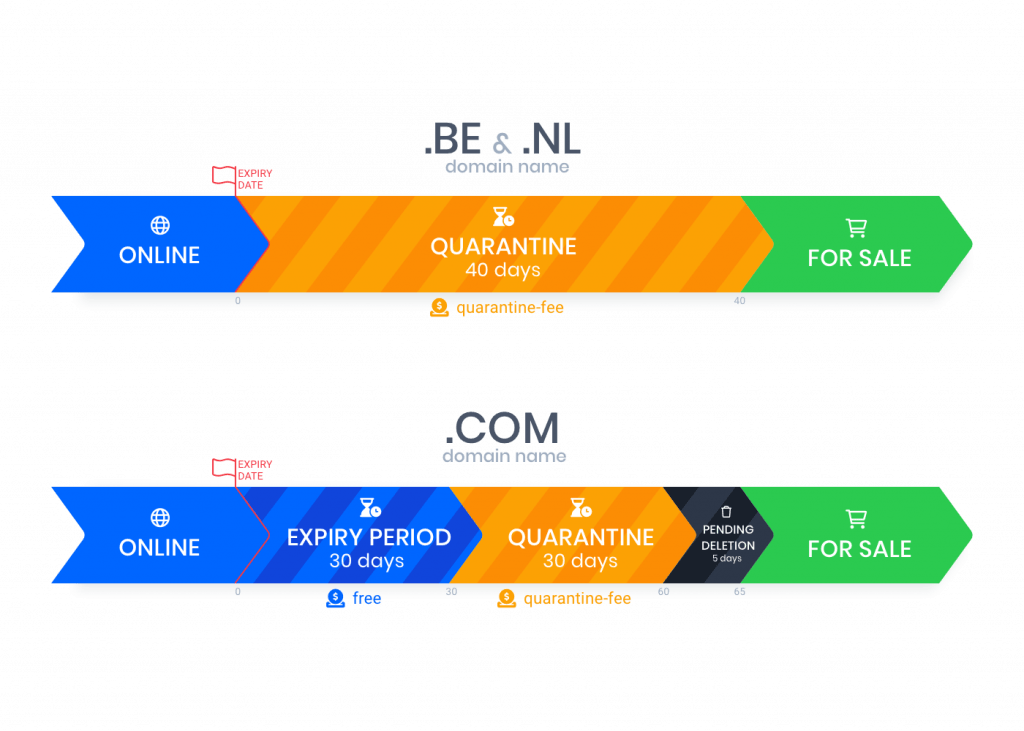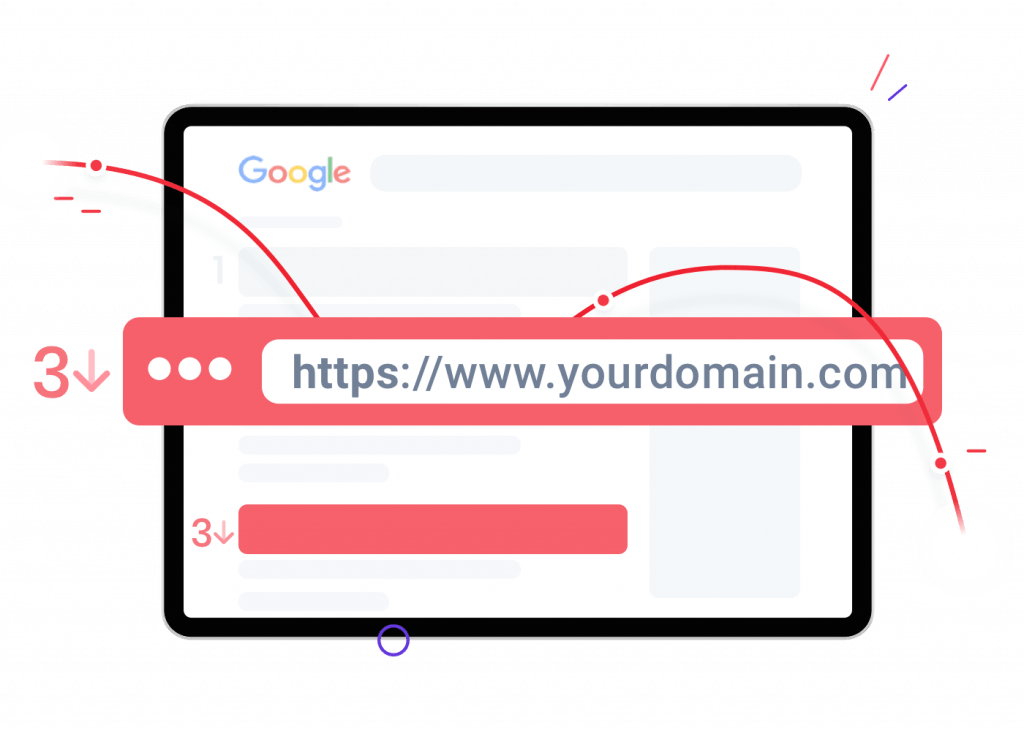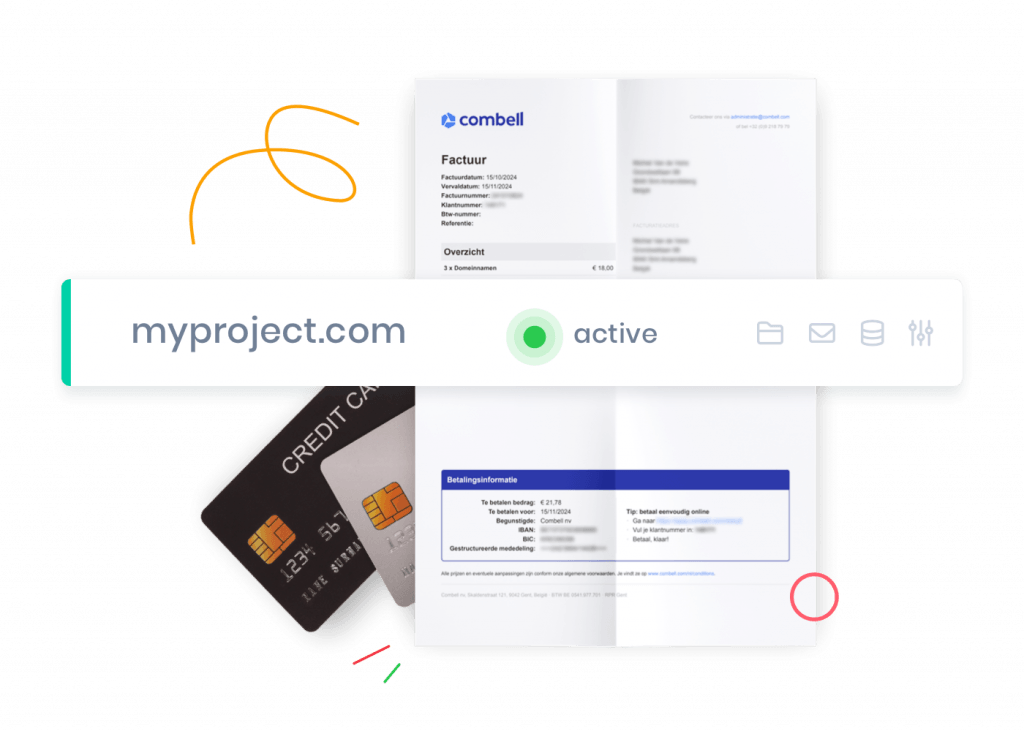Why you should avoid a domain name in quarantine

A domain name is the online address where customers find your business. If you have your own website or webshop, it's essential. But what happens if you forget to renew your domain name? Will you lose it? Fortunately, a domain name is first placed in quarantine, so you still have a chance to recover it. However, it’s best to avoid having your domain name go into quarantine altogether.
- What is a domain in quarantine?
- Just like your gym membership
- How long does the quarantine period last?
- Retrieving a domain from quarantine involves costs
- Consequences for your domain name
- How to retrieve a domain from quarantine
- Are you too late and has the quarantine period ended?
- What if someone else takes over your domain name?
- Your domain name in quarantine: how to prevent it
- Frequently asked questions about quarantined domain names
What is a domain in quarantine?
A domain name is considered to be "in quarantine" when it has not been renewed or extended on time. As a result, the host places the domain in quarantine to give the owner a chance to reclaim it.
While it's not ideal, having a domain in quarantine isn't necessarily a disaster. The quarantine period acts as a safeguard for domain owners who have forgotten or delayed their renewal. As long as the domain remains in quarantine, no one else can register it.

Just like your gym membership
Forgetfulness, missed invoices, and reminder emails that land in your spam folder – there are plenty of reasons why you might forget to renew your domain name. But make no mistake: registering a domain name doesn’t mean it’s yours forever.
A domain name needs to be renewed annually. Think of it like your gym membership – after a certain period, you need to renew it, or you won’t be able to use the facilities. The same applies to your domain name. Unlike the address of your home, which you own permanently, your online address is something you rent, so you must renew it on time.
Did you know...
There’s a clear difference between an expired domain and a domain in quarantine? We only talk about an expired or lapsed domain if it hasn’t been renewed or reactivated after the quarantine period. At that point, the expired domain becomes available on the market again. With a domain in quarantine, however, only the owner has the chance to reactivate it during a set period.
How long does the quarantine period last?
A .be domain stays in quarantine for 40 days. During this time, only the current owner can reactivate the domain. After 40 days, the quarantine is lifted, and the domain becomes available for anyone to register. The same applies to .nl domains.
For a .com domain, the process starts with an "expiry period" of 30 days, during which the owner can reactivate the domain without extra charges (though renewal costs must still be paid).

After the 30-day expiry period, the domain enters quarantine for another 30 days. At this point, the owner can only reactivate the domain by paying both the quarantine fees and the renewal costs.
Following these 30 days of quarantine, the domain goes into a "pending deletion" phase for 5 days, during which the domain cannot be reactivated by anyone and remains blocked until it becomes available for public registration.
Since .com domains fall under gTLDs (generic top-level domains like .com, .org, .net), stricter rules apply for quarantined domains. Losing a domain can have significant consequences, especially as a domain name is a crucial part of any online business.
Retrieving a domain from quarantine involves costs
To ensure you don’t lose your domain name, you can have it reactivated by your hosting provider. However, this does come with additional costs, primarily because the hosting company needs to work with a third party to bring your domain back online.
At Combell, you typically pay €75.00 in quarantine fees to restore a .be domain. For a .com extension, the cost is €145.00. Please note that these prices are exclusive of VAT.
Consequences for your domain name
Let’s discuss the potential consequences. What should you expect if your domain name is in quarantine, and what are the risks you might face?
While you may not have lost your domain yet, once it’s in quarantine, it becomes unavailable. This means your website or webshop will be offline, and you’ll lose access to any email accounts linked to the domain.
Beyond losing valuable time, you’ll also be losing internet traffic, customers, and revenue. Your reputation could suffer before you realize it!

A domain name that goes into quarantine and goes offline can negatively impact your search engine optimization (SEO). Search engines like Google will mark the domain as inactive, which can affect your website’s ranking.
The lower you appear in Google search results, the less organic traffic you will receive.
If you want to retrieve your domain name from quarantine, there are often additional fees involved that are higher than the standard renewal costs.
You don’t want to experience this: if you fail to restore your domain name within the quarantine period, someone else can register it once it becomes available. This means you risk losing your domain to competitors or domain squatters. Recently, hundreds of expired government domain names and email addresses were sold for just €8 each!
How to retrieve a domain from quarantine
Have you noticed that your domain is offline and realized you forgot to renew it? The first thing you should do is contact your registrar (the company where you registered your domain, like Combell). Our support team is available 24/7, and in your native language, to assist you.
Depending on your domain extension (Redemption Grace Period or standard Redemption Period), you can usually recover the domain relatively quickly through your registrar. Keep in mind that retrieving a domain from quarantine always involves extra costs.

Are you too late and has the quarantine period ended?
If your expired domain has been released, two scenarios are possible. If you're lucky and no one has registered the domain yet, it’s now available on the market, even for you. In this case, you can simply register it as a new domain.
However, if someone else has already taken it, you’ll need to track down the new owner and try to reach an agreement to have the domain transferred to you. This can be challenging, and in the worst case, you may have to pay a significant amount of money to buy back your domain.
What if someone else takes over your domain name?
A domain enters quarantine to protect the owner, but this protection doesn’t last forever. If you didn’t take action while your domain was in quarantine and someone else has purchased it, you’re in a difficult position.
Your domain name is crucial to your online presence. Without it, your entire digital identity is at risk. You lose all control over your website, meaning that visitors typing your domain name will no longer be directed to your site but possibly to the new owner's website.
From reputation damage to loss of revenue
The new owner of your domain name can do whatever they want with it. For example, they could redirect it to a pornographic site or a website promoting hateful messages. This would cause yourcustomers to lose trust in you, leading to significant consequences.
In addition to reputation damage and the loss of customers, traffic, and revenue, you could also face technical issues. It's highly likely that you’ll lose access to the email accounts linked to the domain. This would disrupt essential tasks like sending newsletters, communicating with customers, and managing administrative tasks.
Furthermore, since your domain is no longer tied to your website, it will become difficult to find in search engines, damaging your SEO ranking—which is crucial for any business running a website or webshop.

Your domain name in quarantine: how to prevent it
- Keep an eye on the expiration date of your domain names. Combell will send you a payment request in a timely manner, either by post and/or email. You can also easily manage your domain names yourself via the handy my.combell.com control panel.
- Add your registrar’s domain to your spam filter’s ‘trusted senders’ list. This ensures that you won’t miss any important emails from your registrar!
- Renew your domain on time. Don’t wait until the last moment to extend it. Consider renewing it for a longer period—why not extend it for at least 5 years to avoid any worries?
- Keep your old domain name, even if you’re no longer actively using it. Use it to redirect visitors to your new projects. You wouldn’t want your old domain to end up hosting a porn site or a site full of malware, would you?
- Check with DNS Belgium or a Whois service to ensure the contact information for your domain(s) is accurate. Avoid having an external web developer or marketing agency listed as the domain holder. The domain holder should be the business owner or an internal staff member with the proper authority.
- Don’t click on links in emails about your domain name unless they’re from your registrar. Only your own registrar will send renewal requests. If in doubt, contact your registrar directly. Be cautious of phishing emails, especially those not from Combell.


